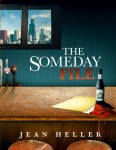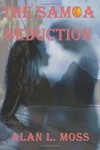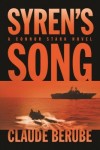

January 25 – 31: “Do thriller writers have conservative or liberal leanings?”
 The presidential campaign is starting to heat up! This week, join ITW Members Jean Heller, Alan L. Moss, Claude Berube, Bernard Maestas and Michael Byars Lewis as they debate whether thriller writers have conservative or liberal leanings. Or, are they apolitical?
The presidential campaign is starting to heat up! This week, join ITW Members Jean Heller, Alan L. Moss, Claude Berube, Bernard Maestas and Michael Byars Lewis as they debate whether thriller writers have conservative or liberal leanings. Or, are they apolitical?
~~~~~
 Most of Jean Heller’s career was as an investigative and projects reporter and editor in New York City, Washington, D.C. and St. Petersburg Florida. Her career as a novelist began in the 1990s with the publication of the thrillers, Maximum Impact and Handyman by St. Martin’s Press. Then life intervened and postponed her new book, The Someday File, to publication in late 2014. Jean has won the Worth Bingham Prize, the Polk Award, and is an eight-time Pulitzer Prize nominee.
Most of Jean Heller’s career was as an investigative and projects reporter and editor in New York City, Washington, D.C. and St. Petersburg Florida. Her career as a novelist began in the 1990s with the publication of the thrillers, Maximum Impact and Handyman by St. Martin’s Press. Then life intervened and postponed her new book, The Someday File, to publication in late 2014. Jean has won the Worth Bingham Prize, the Polk Award, and is an eight-time Pulitzer Prize nominee.
 Alan L. Moss is a unique and emerging voice in the thriller genre. His writing draws upon Ph. D. research capabilities and many years in Washington D.C. as a federal Chief Economist, Congressional Fellow in the U.S. Senate, and Adjunct Instructor at the University of Virginia’s Northern Virginia Center. In 2002, he put his government career aside and moved to the Jersey Shore to pursue his writing. His published novels spin sophisticated tales of conspiracy, love, sex, revenge, and subterfuge. After years of politics and bureaucracy, Alan has found the freedom of writing fiction an intoxicating and satisfying calling. His latest work, The Samoa Seduction, is the story of two lovers trapped by a deadly conspiracy to gain millions from the sale of a stem cell cure for diabetes.
Alan L. Moss is a unique and emerging voice in the thriller genre. His writing draws upon Ph. D. research capabilities and many years in Washington D.C. as a federal Chief Economist, Congressional Fellow in the U.S. Senate, and Adjunct Instructor at the University of Virginia’s Northern Virginia Center. In 2002, he put his government career aside and moved to the Jersey Shore to pursue his writing. His published novels spin sophisticated tales of conspiracy, love, sex, revenge, and subterfuge. After years of politics and bureaucracy, Alan has found the freedom of writing fiction an intoxicating and satisfying calling. His latest work, The Samoa Seduction, is the story of two lovers trapped by a deadly conspiracy to gain millions from the sale of a stem cell cure for diabetes.
 Bernard Maestas lives in paradise. A police officer patrolling the mean streets of Hawaii, he has a background in contract security and military and civilian law enforcement. When not saving the world, one speeding ticket at a time, and not distracted by video games or the internet, he is usually hard at work on his next book.
Bernard Maestas lives in paradise. A police officer patrolling the mean streets of Hawaii, he has a background in contract security and military and civilian law enforcement. When not saving the world, one speeding ticket at a time, and not distracted by video games or the internet, he is usually hard at work on his next book.
 Claude Berube is the author of the Connor Stark novels – THE ADEN EFFECT (Naval Institute Press, September 2012) and SYREN’S SONG (Naval Institute Press, November 2015.) He earned his B.A. in History and Soviet Studies, his M.A. in History from Northeastern University, and his M.A. in National Security Studies from the Naval War College. He is currently writing his doctoral dissertation through the University of Leeds on Andrew Jackson’s Navy. He has co-authored two books: A Call to the Sea: Captain Charles Stewart of the USS Constitution (Potomac Books, 2005) and Congress: Games and Strategies (Rowman & Littlefield, 2007 & 2009). He is the co-editor of Maritime Private Security: Market Responses to Piracy, Terrorism and Waterborne Security Risks in the 21st Century (Routledge, 2012) His articles have appeared in The Washington Times, Forbes.com, The Christian Science Monitor, Jane’s Intelligence Review, Orbis, Small Wars Journal, Vietnam Magazine, Naval History and Naval Institute Proceedings. He is a regular contributor to WarontheRocks.com.
Claude Berube is the author of the Connor Stark novels – THE ADEN EFFECT (Naval Institute Press, September 2012) and SYREN’S SONG (Naval Institute Press, November 2015.) He earned his B.A. in History and Soviet Studies, his M.A. in History from Northeastern University, and his M.A. in National Security Studies from the Naval War College. He is currently writing his doctoral dissertation through the University of Leeds on Andrew Jackson’s Navy. He has co-authored two books: A Call to the Sea: Captain Charles Stewart of the USS Constitution (Potomac Books, 2005) and Congress: Games and Strategies (Rowman & Littlefield, 2007 & 2009). He is the co-editor of Maritime Private Security: Market Responses to Piracy, Terrorism and Waterborne Security Risks in the 21st Century (Routledge, 2012) His articles have appeared in The Washington Times, Forbes.com, The Christian Science Monitor, Jane’s Intelligence Review, Orbis, Small Wars Journal, Vietnam Magazine, Naval History and Naval Institute Proceedings. He is a regular contributor to WarontheRocks.com.
 Michael Byars Lewis, is a former AC-130U ‘Spooky’ Gunship Evaluator Pilot with 18 years in Air Force Special Operations Command. A 25-year Air Force pilot, he has flown special operations combat missions in Bosnia, Iraq, and Afghanistan. His first novel, SURLY BONDS, won three awards and his second novel, VEIL OF DECEPTION, will be released in April.
Michael Byars Lewis, is a former AC-130U ‘Spooky’ Gunship Evaluator Pilot with 18 years in Air Force Special Operations Command. A 25-year Air Force pilot, he has flown special operations combat missions in Bosnia, Iraq, and Afghanistan. His first novel, SURLY BONDS, won three awards and his second novel, VEIL OF DECEPTION, will be released in April.
- LAST GIRL MISSING with K.L. Murphy - July 25, 2024
- CHILD OF DUST with Yigal Zur - July 25, 2024
- THE RAVENWOOD CONSPIRACY with Michael Siverling - July 19, 2024
